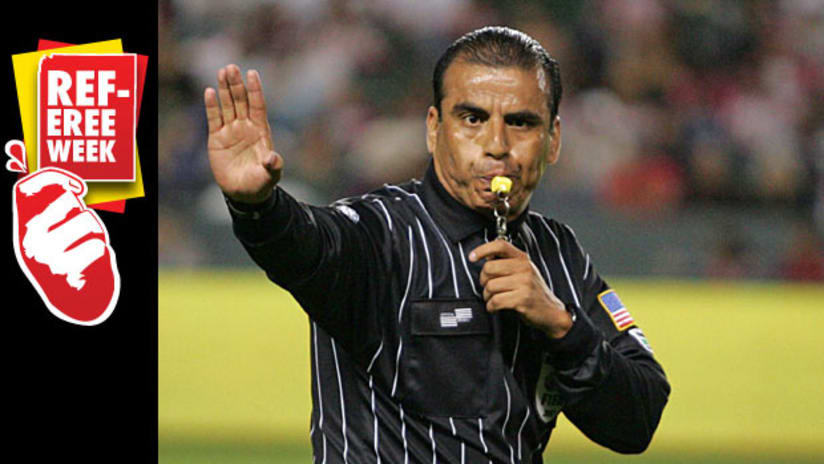As part of Referee Week here on MLSsoccer.com, FutbolMLS.com editors Edgar Acero and Kristel Valencia spoke with current MLS referee Baldomero Toledo on the latest edition of the Spanish language podcast Tiro Libre.
Here are some translated excerpts from the interview. To listen to the podcast, please click here.
On players simulating fouls:
“We as refs don’t want to see players trying to deceive us, and not only us, but also everyone at the stadium. It’s disrespectful to the people who go to watch a good game of soccer. Those are things that don’t belong in soccer, and as refs we have to punish it.”
“I think the only way we’re going to get rid of that behavior is by punishing it anytime someone attempts to do it.”
On the league’s mandate to protect skillful players:
“I believe that we, as refs, have the responsibility to protect all 22 players who are participating in the game. The thing is that there are cases where people outside of the game, or the press, watch those players who are more dangerous, and those are the ones that receive more physical contact. Part of our job is to figure out who those skillful players are, so that we can anticipate the fact that they’re going to be fouled.”
“But generally, our responsibility is to protect every one of them, but we have to protect the skillful ones because they are targets even before the game begins.”
On the toughest calls to make:
“All fouls are hard to call, but there are those where you can’t make a mistake, and those are the ones inside the box. Those are the ones where the refs need to have zero tolerance. Those calls, whether they’re right or wrong, will always create controversy no matter what.”
On the toughest player to ref:
“There are players who are very difficult to control because they try to do things behind the referee’s back. Cuauhtémoc Blanco is, in my opinion, one of the toughest players to ref. Why? Not only because he would go face to face with the ref, but also because he liked to simulate fouls.”
“I’m not taking about him as a person; I’m just saying that inside the field he was tough to control. So we had to get to know him in order to call him on simulating fouls and figure out when he was right to criticize and when he wasn’t.”
On the differences between calls in MLS and other countries:
“The difference in our soccer here in MLS is that we have a style that’s physical. In the United States we like to keep the flow of the game going, so some of the small contact that’s allowed here might be called as a foul in other countries. There’s more contact here and the teams are in agreement that that’s the kind of soccer they wish to play. As refs, we’ve learned to not call small fouls that will only interrupt the flow of the game.”
On full-time and part-time refs:
“We have a program that we follow that has been very successful. It’s a four-year program for the full-timers. (US Soccer) gave me the chance to be part of it and my responsibility is to only focus on this. Our performances on the field have to be the best because we have the time to study the games and to prepare physically and mentally.”
“It’s more difficult for my colleagues who are not full-time, as many of them have a primary job. Being a ref to them is more like a hobby, something that they can’t spend all their time focusing on. I admire them and congratulate them in the work they do, because they have to make a lot of sacrifices to be prepared.”











